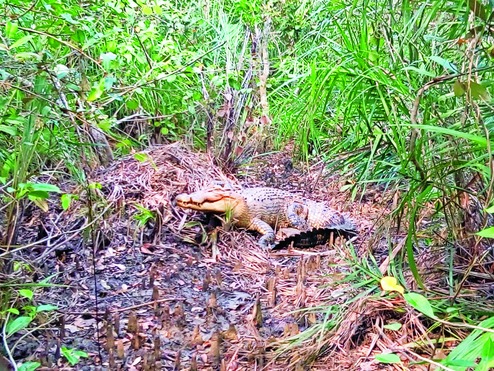
Kendrapara: The Bhitarkanika National Park has re-established itself as the largest habitat of estuarine crocodiles in the state as wildlife personnel confirmed a rise in nest-sighting this year.
Wildlife personnel have spotted 101 nesting sites this year even though the annual breeding ritual of these reptiles has come to an end.
"Last year, 80 nests were sighted by enumerators, accounting for one-forth rise in the number of nests," said a forest official.
The nests were sighted by wildlife enumerators of the forest department along the innumerable nullahs, creeks and water-inlets in the Bhitarkanika river system.
A group of experienced wildlife staffs were engaged in the counting of nests. They ventured into deep mangrove forest for nest-sighting. "The job was quite adventurous and a lot of risked is involved in the nest counting exercise as mother crocodile often turns furious over human interference anywhere near the nest," said Rajnagar divisional forest officer Bimal Prasanna Acharya.
"It is a positive sign that more nests were sighted this time. This has established Bhitarkanika as the ideal nesting ground for estuarine crocodiles," Acharya said.
Female crocodiles lay 50 to 60 eggs. Hatchlings usually emerge from the nests after 70 to 80 days of incubation period.
A forest department official said steps have been taken this time by wildlife staff to ensure crocodile eggs were not devoured by snakes, jackals and dogs, found in the reserve.
According to latest census, the population of these species has swollen to 1698 while it stood at 1682 last year. Adequate conservation measures by the state forest department have led to a systematic rise in the number of these reptiles over the years.
Salt-water crocodile species are not found in any other river system in the state.
The wildlife sanctuary has remained out of bounds for tourists and visitors to ensure disturbance-free annual nesting of crocodiles. "The enforced restriction on entry to sanctuary was clamped on 31 May and it would be lifted on July 31," said an official.










